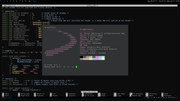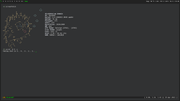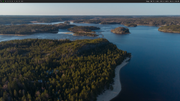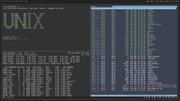You are not logged in.
- Topics: Active | Unanswered
#151 Re: Off-topic » Show your desktop (rebooted) » 2021-05-02 12:20:51
#152 Re: Devuan » As Debian 11 moves closer to Devuan. Is there any reason to stay on De » 2021-05-02 11:50:26
Centralization is bad.
Also, since we've been getting GNU/Linux Mint refugees (myself included), this can influence Devuan's development as there will be more potential beta testers, packagers, and forum regulars who can share their wealth of knowledge. I like it better that way than going big with corporate sponsorships (e.g. Red Hat, Canonical, Microsoft, Intel, HP).
yep its good to see mint going this way, have always had a soft spot for mint as it was one of the first distros i installed over windblows.
#153 Re: Off-topic » ${THEY} continue crippling browsers... » 2021-05-02 11:46:29
Anyway, back on-topic, it seems that the justification by Mozilla's apologists for embedding JavaScript in PDFs is that "almost every webpage have JavaScript anyway, so why bother about security?"
But they are looking on the wrong direction. If you need dynamic content, you should use HTML for that, because that's designed for the web (unlike PDFs). PDF is already a PITA in terms of security in the past, why reintroduce that nightmare? When Adobe, which is native, does it, it's not okay, but when browsers do it, which never was meant to render PDFs, it's okay all of a sudden? I don't understand.
exactly., they are trying to do far too much stuff imo. Years ago browsers did not have embedded pdf viewers, you needed outside software for this, namely adobe, but not anymore due to foss. Mupdf, ftw! Smart folks create website without javascript sorcery, but it seems it is the ever present cancer killing most websites these days.
#154 Re: Desktop and Multimedia » Copy files from a playlist to a USB device » 2021-05-01 11:56:39
head on a stick nailed it.
I did a test with rsync and this is how i went about it, although i would probably stick with the bash command from head on a stick.
first created a dummy directory for testing.
~$ tree audio/
audio/
└── cds
├── 1
│ └── 1.mp3
├── 2
│ └── 2.mp3
├── 3
│ └── 3.mp3
└── 4
5 directories, 3 filesthen created my playlist.m3u
find /home/dice/audio/cds/ -type f -iname "*.mp3" > playlist.m3uthe contents of playlist.m3u
/home/dice/audio/cds/2/2.mp3
/home/dice/audio/cds/3/3.mp3
/home/dice/audio/cds/1/1.mp3then added a random directory number 5 not on the playlist.
~$ tree audio/
audio/
└── cds
├── 1
│ └── 1.mp3
├── 2
│ └── 2.mp3
├── 3
│ └── 3.mp3
├── 4
└── 5
└── 5.mp3
6 directories, 4 filescreated test directory for the rsync.
/home/dice/test-usb-dirnow the rsync command.
rsync -a --include-from=/home/dice/playlist.m3u --delete --delete-excluded --prune-empty-dirs /home/dice/audio test-usb-dir/
edit: this command is better
rsync -av --relative $(cat ~/playlist.m3u) test-usb-dir/result
~$ tree test-usb-dir/
test-usb-dir/
└── home
└── dice
└── audio
└── cds
├── 1
│ └── 1.mp3
├── 2
│ └── 2.mp3
└── 3
└── 3.mp3
7 directories, 3 filesthis seems to work for me and I will test this with some actual audio files in music directory soon.
#155 Re: Desktop and Multimedia » Copy files from a playlist to a USB device » 2021-04-30 13:45:17
To clarify a bit more having sort of understood what you want, rsync is your tool here.
Have a look at this.
#156 Re: Desktop and Multimedia » Copy files from a playlist to a USB device » 2021-04-30 13:08:35
In that case id just clone the directories /srv/Audio/CDs using rsync ?
and then copy over the .m3u file to the usb, wouldnt that work?
#157 Re: Desktop and Multimedia » Copy files from a playlist to a USB device » 2021-04-30 12:55:22
EDIT: I forgot the m3u ...
find /srv/Audio/CDs -name \*.wav -o -name \*.m3u -print0 | xargs -0 cp -t /media/usb_deviceor perhaps
find /srv/Audio/CDs -type f -print0 | xargs -0 cp -t /media/usb_device
That second command does the job nicely.
#158 Re: Desktop and Multimedia » Copy files from a playlist to a USB device » 2021-04-30 12:46:31
so what is the base directory, is it /srv/Audio/ for all 500 .wavs files and directories? Looks like you need to recurse into the many artists and album directories. Maybe tree the /srv/Audio/ directory to see what you have there?
tree /srv/Audio/#159 Re: Installation » [SOLVED] WiFi doesn't autoconnect after Beowulf to Chimaera » 2021-04-30 11:56:37
by startup do you mean a reboot of the machine?
Its just another way to connect wpa_supplicant using a conf file. Thought it might help.
#160 Re: Devuan Derivatives » Xevuan » 2021-04-30 11:43:00
This has had quite a update, source files are there now. Looks like the creator is moving on to voidlinux for the next release.
https://github.com/dessington/xevuan
I just tried the xevuan version 1.0 and it is quite good.
#161 Re: Desktop and Multimedia » Copy files from a playlist to a USB device » 2021-04-30 11:31:56
You should be able to glob/wildcard the .wav extension.
cp server/playlist/*.wav /media/usb_device?
#162 Re: Installation » [SOLVED] WiFi doesn't autoconnect after Beowulf to Chimaera » 2021-04-30 11:14:26
First check rfkill ( tool for enabling and disabling wireless devices )
# apt install rfkillthen let us know the output of using sudo or root account
# rfkill list sorry i didnt read your post correctly.
You can manually connect using ifup wlan0 ?
so maybe reset the network interfaces file like so.
# wpa_passphrase ESSID WPAKEY > /etc/wpa_supplicant/wpa_supplicant.confthen edit /etc/network/interfaces file to look like so.
auto lo
iface lo inet loopback
auto wlan0
iface wlan0 inet dhcp
wpa-conf /etc/wpa_supplicant/wpa_supplicant.conf#163 Re: Desktop and Multimedia » [SOLVED] Toshiba Tecra S2 » 2021-04-29 12:44:22
glad you got it working!
One cannot be without sound in this world if at all possible.
Cool you got that machine up and running with devuan beowulf too ![]()
#164 Re: Hardware & System Configuration » [SOLVED] Need some support for setting up wifi correctly » 2021-04-28 14:13:43
nevermind.....
#165 Re: Desktop and Multimedia » [SOLVED] Toshiba Tecra S2 » 2021-04-28 11:51:22
Users shouldn't need to be in the audio group for the speakers to work.
@OP: can we see
aplay -l amixer
Having read the archwiki this is true, but debian wiki says something completely different, maybe it is just due to gnome desktop, either way you might be right and may have no bearing on speaker function.
https://wiki.debian.org/SoundConfiguration
Use 'adduser USER_NAME audio' to allow a specific user to write to the /dev/dsp, /dev/mixer and /dev/audio devices and thus output sound from the soundcard; note: the user needs to log off and on again for such changes to take effect! This is the recommended way to allow a user to play audio. If, instead, you changed the permissions of the /dev/audio etc devices to make them accessible to anyone, that would open a security hole because you would be allowing any trojan to read the microphone device.
better is to add your user to the audio group
Unix Group
If you notice that a user starts up Gnome and receives a message about Audio not working the likely cause is that the user is not in group audio (only the initialy created user is in the audio group by default).
I take it they must be talking about remote user of gnome? Vague to say the least.
#166 Re: Desktop and Multimedia » [SOLVED] Toshiba Tecra S2 » 2021-04-28 11:29:43
That is quite an old laptop from 2005, see this link...
https://forums.whirlpool.net.au/archive/461197
Post 5 says....
To active the sound on the digital output, all I had to do was to *mute* the IEC958 Playback...
Im assuming IEC958 Playback should showup in alsamixer in the terminal ?
Maybe try installing alsa-oss package ??
https://wiki.debian.org/SoundConfiguration
Head on a stick will probably have a better analysis than me though.
I could be completely off the mark here as i dont know much about this, but cant hurt to try simple commands.
Interesting to note some info on
https://alsa.opensrc.org/Realtek_ALC650 aka, 'traditional' Intel Audio Codec 1997 (AC'97) standard. Which is listed in your output.
#167 Re: Off-topic » Music » 2021-04-27 13:51:51
#168 Re: Desktop and Multimedia » [SOLVED] Toshiba Tecra S2 » 2021-04-27 13:42:09
Im assuming you are on stable/beowulf devuan installation.
Have you read the release notes, it may help with the pulseaudio issue. As for alsa, maybe the master needs to be unmuted. Do you have any physical knobs or sliders on the machine ?
https://files.devuan.org/devuan_beowulf … _notes.txt
Are you in the audio group?
Pulseaudio
- If you install a desktop environment from the installer iso, you will
automatically get the debian-pulseaudio-config-override package,
which will ensure that pulseaudio is running. If you're running a
window manager, you may need to install the override package to get
sound. Alternatively, you may use the old method, described below.
- If you have no sound, make sure the following line in
/etc/pulse/client.conf.d/00-disable-autospawn.conf is commented as
shown here:
#autospawn=no#169 Re: Off-topic » Show your desktop (rebooted) » 2021-04-25 10:42:36
#170 Re: Off-topic » Caution, Wet! Computing explained » 2021-04-25 10:37:11
I remember programming locomotive controls with a 8086 back in 1986. The system had 1kbyte SRAM with an option for a 2nd kByte. So I put the second SRAM into the socket. Powered up, loaded the program. run it. Writing value<>0 to the second RAM resulted in all being 0 or false. Damn. Checking the program. Reading the address contents again and again. Eventually RTFM again. 2nd RAM needs a jumper next to it. Put the jumper. Works.
Clue : If you use beer everything will be false.
2nd Clue : The keyboard will become sticky with a Weizen inside. tried that too.
haha, good one.
I was more or less thinking of the quote:
"A drunk man's words are a sober man's thoughts"
Beer tends to bring out one's "inner truth" as it were..
#171 Re: Off-topic » Caution, Wet! Computing explained » 2021-04-24 14:31:49
if you use beer everything will be true !
Interesting video, the yes/no true/false paradigm is an interesting one, especially the maths behind it going back to boolean algebra and the man who invented it, George Boole.
#172 Re: Off-topic » ${THEY} continue crippling browsers... » 2021-04-24 13:46:48
agree with you fully yeti, once "they" start stripping away the origins of how the web was created they will replace it with crapware.
https://man.openbsd.org/ftp FTW.
When i set my openbsd system up i purposely used ftp to get most of the parts i needed outside of openbsd that i wanted including suckless tools wherever i could, then it was git clone which i believe uses curl ftp. Of course i was able to get links and info using well "links".
#173 Re: Installation » [SOLVED] Old 4.9.0-8-amd64 modules in /lib/modules » 2021-04-23 15:03:01
do you still have 4.9.0-8-amd64 linux kernel installed ?
dpkg -S, --search filename-search-pattern...
Search for a filename from installed packages.So must still have that kernel installed. Updating to a newer release will not purge your kernels for you, you have to manually do this.
#174 Re: Installation » [SOLVED] Old 4.9.0-8-amd64 modules in /lib/modules » 2021-04-23 14:23:03
Those modules are only going to be found if you have that version of the kernel installed and not properly uninstalled though i believe?
~$ dpkg -S /lib/modules/*
linux-image-4.19.0-14-amd64: /lib/modules/4.19.0-14-amd64
linux-image-4.19.0-16-amd64: /lib/modules/4.19.0-16-amd64
linux-image-4.19.0-6-amd64: /lib/modules/4.19.0-6-amd64For instance i still have linux-image-4.19.0-6-amd64 on my system, once i purge that kernel the modules are also purged.
I use ..
# apt purge linux-image-4.19.0-6-amd64~$ dpkg -S /lib/modules/*
linux-image-4.19.0-14-amd64: /lib/modules/4.19.0-14-amd64
linux-image-4.19.0-16-amd64: /lib/modules/4.19.0-16-amd64#175 Re: Off-topic » What are you reading/want to read ? » 2021-04-23 13:43:39
Head_on_a_Stick wrote:Legacies of the Sword: The Kashima-Shinryu and Samurai Martial Culture by Karl Friday
It finally arrived. A very good book — the author is both a professor of Japanese history and also a shihan (Kashima-Shinryū instructor) so it is an authoritative text on the subject. Now I just have to wait for the local chapter to re-open. Bloody COVID.
I also received my copy of A Canticle For Leibowitz by Walter M. Miller, a seminal science fiction classic.
That would be an interesting read, i like reading up on Japanese history, especially its architecture, carpentry and ancient methods of building.
Im current reading, How to be free by Tom Hodgkinson. It is quite the literary masterpiece in my opinion.
A joyful blueprint for a simpler and freer way of life. Medieval in places.
If you've ever wondered why you bother to go to work, or why so much consumer culture is crap, then this book is for you. Looking to history, literature and philosophy for inspiration, Tom Hodgkinson provides a joyful blueprint for a simpler and freer way of life. Filled with practical tips as well as inspiring reflections, here you can learn how to throw off the shackles of anxiety, bureaucracy, debt, governments, housework, supermarkets, waste and much else besides.
https://www.punkt.ch/en/inspiration/lib … to-be-free
I picked it up for a dollar at the local salvos.






